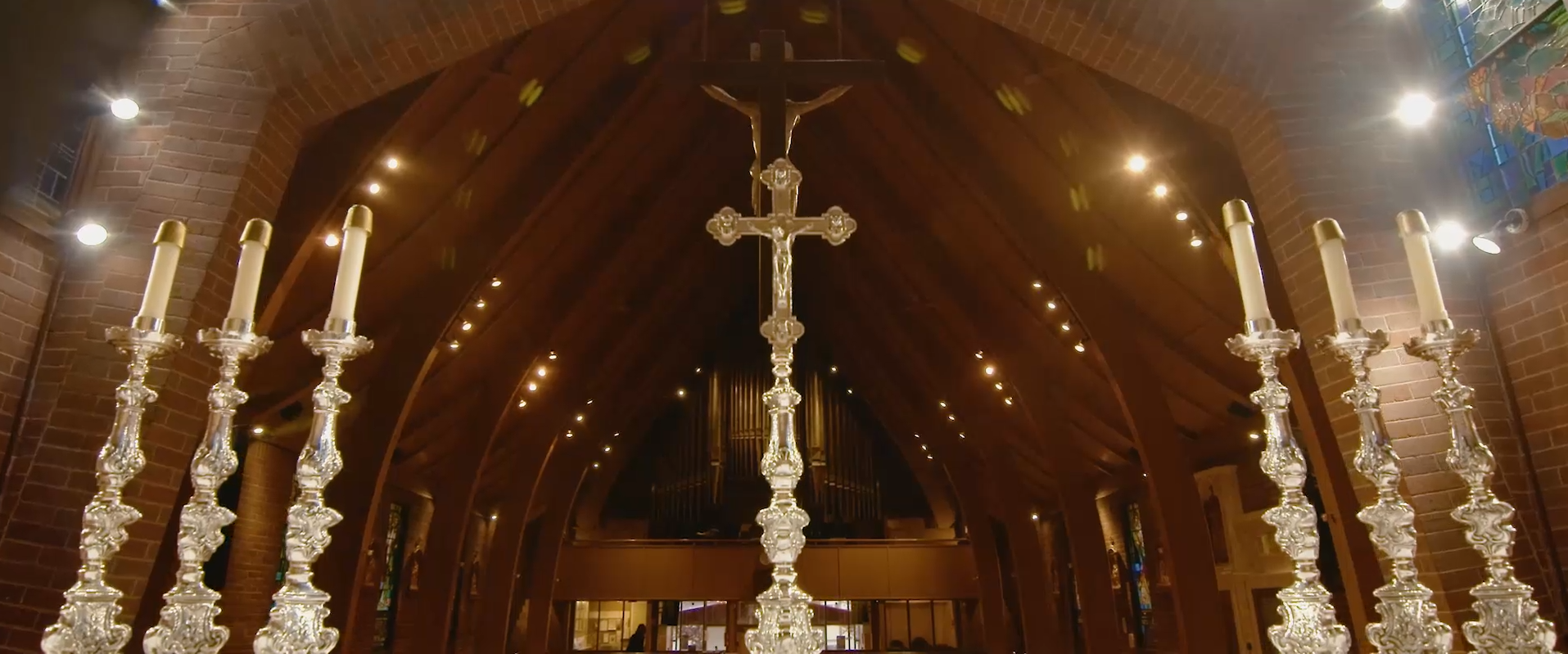A few years ago, there was a marriage preparation course called God’s Plan for a Joy-filled Marriage, and the speaker asked a roomful of engaged couples, “How many of us want to have a joy-filled marriage? You see the statistics of divorce, and many of us come from divorced parents. In addition, there are couples that stay together—but how many of them have joy-filled marriages? Many are just surviving. Now, if I told you God has a plan for a joy-filled marriage, it would pique your interest, would it not?” And the audience was hooked, because everyone wants that.
Two more examples: 1) I once told a friend, “Hey, I talked to Nick recently (whom I hadn’t seen in four years). He was so mature, confident and professional (which was remarkable, because Nick used to be very shy).” And my friend said, “Really! How do you get like that?” He asked that question because, when he heard about Nick, he was inspired and he wanted to be mature, confident and professional!
2) Thousands of Catholics have read about a parish that was dying: 96% of the people only went to this church because it had convenient parking! But after God turned the parish around, they now have, for example, on Sunday, four hospitality teams: a Parking Team, Host Team, Information Team, and Café Team to guarantee that “everyone who visits (their parish)… will have at least two friendly interactions with someone” (Fr. Michael White & Tom Corcoran, Rebuilt, 110). When Catholics read about this, they also want to have a church that is alive and thriving.
These three examples show how the Holy Spirit gives people a picture of a better future, and that speaks to their souls.
Did you know that God always wants to give you and me a more beautiful future? God is love itself, created us for happiness, and always wants us to receive more. He wants tomorrow to be better for us than today (This doesn’t mean there will be no suffering; there will be suffering, but God still wants us to receive more graces than today). In the Second Reading, St. Paul reveals, in four parts, that God has a vision for us: 1) He says our Father “chose us in Christ before the foundation of the world to be holy and blameless” (Eph 1:4); 2) “He destined us for adoption to sonship” (1:5); 3) “He has made known to us the mystery of his will… as a plan for the fullness of time, to gather up all things in him” (1:8-10); 4) We “have been destined according to the purpose of him… so that we… might live for the praise of his glory” (1:11-12).
This is God’s vision for humanity: He has chosen us to become like Him, to be holy, and He desires to gather everyone to Himself so that we can praise and love Him. That’s a beautiful picture of the future! However, after that general vision, there are more specific visions for each person and community.
Sixteen months ago, our parish joined the Divine Renovation Network, which is a group of hungry parishes from around the world that want to do God’s will for their communities, and move from maintenance mode to mission mode. I knew we needed help because renewing a parish is hard, messy work and there’s no clear-cut plan. So, roughly every week, our Leadership Team and I get coaching from the staff of St. Benedict’s parish in Halifax, one of the most vibrant parishes in the world. They are so vibrant that they even host an international conference every two years.
Last July, our coach, Eileen, who was a corporate strategist by trade and former chair of St. Benedict’s pastoral council, explained that parish renewal begins with God’s vision for the parish. Now I knew God wanted us to grow in holiness and mission, but she taught us that God has a very specific vision for us. She said it took her church six months to discern their vision, because knowing God’s vision takes humility, listening, waiting, and conversion.
We did the same and it took us eight months of praying, brain-storming, reading, writing and re-writing, getting feedback and then fasting, and on Apr. 30, God gave it to us. In the future, this is who we will be: “With the Eucharist at the centre, we are a community desiring to be saints, sent out to love like Jesus and proclaim Him in every circumstance!”
Now this is bold and gutsy, because becoming a saint is impossible for us, but not for God; becoming an outward-focused church will mean lots of change. It actually scares me to announce this because now there’s no turning back! Nevertheless, the fact that it’s so lofty is proof that it’s from God; and, I noticed after the fact that it matches God’s vision in the Second Reading!
In the future, we’re going to talk about this vision all the time. We want to invite everyone to get on board and make improvements according to it. Right now, let me briefly outline what our vision means:
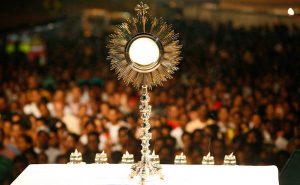 “With the Eucharist at the centre” means we’re focusing on the most important treasure we have: Jesus. He is everything, the goal of history, the meaning of our lives, and without Him, we can do absolutely nothing. For example, from our parish have come two priestly vocations, a brother, and a sister, and we have one man at Westminster Abbey right now. However, Christ the King Parish in Michigan has had 30 priests and 8 deacons ordained; and currently 8 seminarians, and 9 women becoming sisters—that’s unbelievable! Their pastor said, “The core thing is that it always has to come back to the Eucharist” (Sherry Weddell, Forming Intentional Disciples, 75). Every saint loved the Mass and spent hours before Jesus in the chapel. I dream of a parish where people are coming in 24/7 in order to kneel before Jesus, sit at His feet, and love Him, and find strength, peace, and renewal.
“With the Eucharist at the centre” means we’re focusing on the most important treasure we have: Jesus. He is everything, the goal of history, the meaning of our lives, and without Him, we can do absolutely nothing. For example, from our parish have come two priestly vocations, a brother, and a sister, and we have one man at Westminster Abbey right now. However, Christ the King Parish in Michigan has had 30 priests and 8 deacons ordained; and currently 8 seminarians, and 9 women becoming sisters—that’s unbelievable! Their pastor said, “The core thing is that it always has to come back to the Eucharist” (Sherry Weddell, Forming Intentional Disciples, 75). Every saint loved the Mass and spent hours before Jesus in the chapel. I dream of a parish where people are coming in 24/7 in order to kneel before Jesus, sit at His feet, and love Him, and find strength, peace, and renewal.
Now raise your hand if you want to be happy? How many want to have more energy and hope, be more peaceful, courageous, so strong and confident that nothing fazes you? Who here would like to treat your family and friends better? That’s what saints are! To be a saint does not mean to be like a statue.
To be “a community desiring to be saints” means to desire these eight ideas: 1) to be truly human/fully alive; 2) to be Christ-like; 3) to do God’s will; 4) to be the best version of ourselves; 5) to be someone who fulfills their vocation/destiny; 6) to be perfect in love; 7) to reach the heights of contemplation; 8) to have the missionary heart of Jesus. We’ll talk about these eight ideas another time.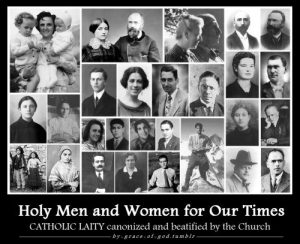
When I was in Rome, one of my classmates was friends with Bl. Chiara Luce Badano. “Wow!” I thought, “you were friends with a saint. It’s really possible for a regular person to become a saint.” Later, when I went to Poland, I saw the parish church of Bl. Jerzy Popiełuszko, and I realized that God can really make saints in normal parishes. That’s what God wants to do here! And we want it too! Remember what Jesus says: “Go big or go home.” That’s a modern translation.
The first half of the vision is about holiness; the second is about mission. Jesus says there are two great commandments: first to love God, and then to love our neighbour, and we can’t separate the two. Holiness and mission are two sides of the same coin: If we don’t live our mission, then we’re not truly holy, because holiness always gives of itself. But, if we don’t love God first, we’ll have nothing to give people, because we’re called to give people God.
 When I think about the phrase, “sent out to love like Jesus,” I get so much purpose and energy in the morning when I’m tired (especially now that the first person I see in the morning is our seminarian, Jerome). To love like Jesus is the best response to any problem in life and the best way to live, period. It’s about encouraging and challenging people, giving and forgiving, serving, healing and sacrificing, preaching the dignity of human life, and, in particular, helping the poor, lonely, and the stranger. If all 1080 of us loved like Jesus in our homes, at work and in public, that would be a game changer. This community is called to be a source of life for people. Imagine if people could say, “I see Jesus in that person” referring to someone here, or would think, “He/she was Jesus for me today.”
When I think about the phrase, “sent out to love like Jesus,” I get so much purpose and energy in the morning when I’m tired (especially now that the first person I see in the morning is our seminarian, Jerome). To love like Jesus is the best response to any problem in life and the best way to live, period. It’s about encouraging and challenging people, giving and forgiving, serving, healing and sacrificing, preaching the dignity of human life, and, in particular, helping the poor, lonely, and the stranger. If all 1080 of us loved like Jesus in our homes, at work and in public, that would be a game changer. This community is called to be a source of life for people. Imagine if people could say, “I see Jesus in that person” referring to someone here, or would think, “He/she was Jesus for me today.”
The phrase, “To proclaim Him in every circumstance,” is based on the truth that the human person cares for other people. Why did so many people take notice of the trapped Thai soccer team? Because we want everyone to be happy. Evangelization is the most loving thing to do, because it’s about introducing people to the greatest person in the world. It’s not about forcing people, but sharing our joy and caring for people.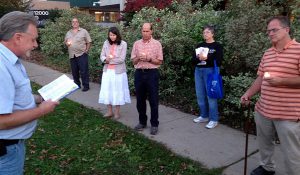
Remember the story about the Prodigal Son? He practically told his father to die when he took his inheritance. The young man then left for a foreign land and lost everything. Now, the Prodigal Son is a symbol of every human person. Jesus came to bring them home, and so do we.
Here’s a fact: Parishes that evangelize grow. Think about any Catholic church you’ve attended: If they’re growing, I guarantee you they’re evangelizing; if they’re lifeless, it’s because they focus on themselves. In the future, I see a parish where people are constantly coming in and going out, each time made better and joyfully sharing what they’ve received.
Everything we do now must be evaluated according to this question: Does it advance God’s vision? Why is Alpha a part of our culture and will become even more so in the future? Because it advances the vision. Why Faith Studies, hiring more people, not rushing Mass? Because they advance the vision. What will the school be doing? Advancing the vision. Think about this: The parish centre is not the priority in our parish. No, it’s a means to achieve the goal. Parishes that focus on buildings die. But parishes that build in order to evangelize thrive. And, because we’ve been focused on God, our campaign is going better than ever!
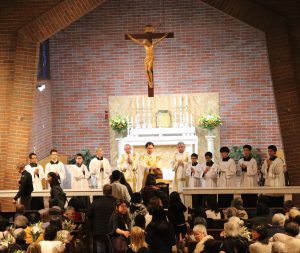 I’m inviting you to embrace God’s vision, support it, and do what you can to fulfill it. And here’s our action item (and this is what St. Benedict’s does): Will you come to Mass every weekend here? In other words, if you choose to make this your parish, and it’s your choice, then the foundation of our plan is what I call our “weekly bread,” the Mass. Why? Because we need a weekly structure to grow, we need to spend time together as a community and support each other, and because the homily will allow us to hear the same message, lay a foundation and build a spiritual tower. The homilies I’m preaching for the next four weeks are already written, and they’re meant to build on each other.
I’m inviting you to embrace God’s vision, support it, and do what you can to fulfill it. And here’s our action item (and this is what St. Benedict’s does): Will you come to Mass every weekend here? In other words, if you choose to make this your parish, and it’s your choice, then the foundation of our plan is what I call our “weekly bread,” the Mass. Why? Because we need a weekly structure to grow, we need to spend time together as a community and support each other, and because the homily will allow us to hear the same message, lay a foundation and build a spiritual tower. The homilies I’m preaching for the next four weeks are already written, and they’re meant to build on each other.
Did you know that most Catholics who leave the Church and go to other churches go to ones that expect more of them? Great churches realize that clear expectations are important. They’re saying: “We guarantee to nourish you, and we expect God to be working in your life.” Having no expectations is like saying, “You’re welcome here, but we don’t expect anything from you at all. You don’t have to do anything or even show up. We don’t expect God to be doing anything in your life and through you” (Fr. James Mallon, Divine Renovation, 153-7).
I’m suggesting we make coming to Saint Anthony of Padua Parish a priority and that, even if we go to Mass somewhere else on a weekend, we also come here that weekend. Next week, we’ll talk about the times when we can’t come here. And, if you’re new here, don’t worry, there’s no pressure. This is something we have to pray about.
This is God’s vision and He’s blessing us with the graces we need to get there. One of the huge blessings is that we’re getting another priest. Fr. Pierre Leblond, the former pastor at St. Mary’s, is coming here because he and I have the same heart: We want to take care of you, so that you can take care of other people. He’s looking forward to celebrating Mass, hearing lots of confessions, and doing talks. When he arrives, we’re going to give him a hero’s welcome. I never anticipated that he would come, but God continues to give us unexpected blessings.
One man told me he loved how this vision honours the uniqueness of every person: This vision will help you become the saint God made you to be. It’s already helped me! It’s made me a better priest, and focused my heart, mind, time and energy. This vision is truly a beautiful picture of the future.
